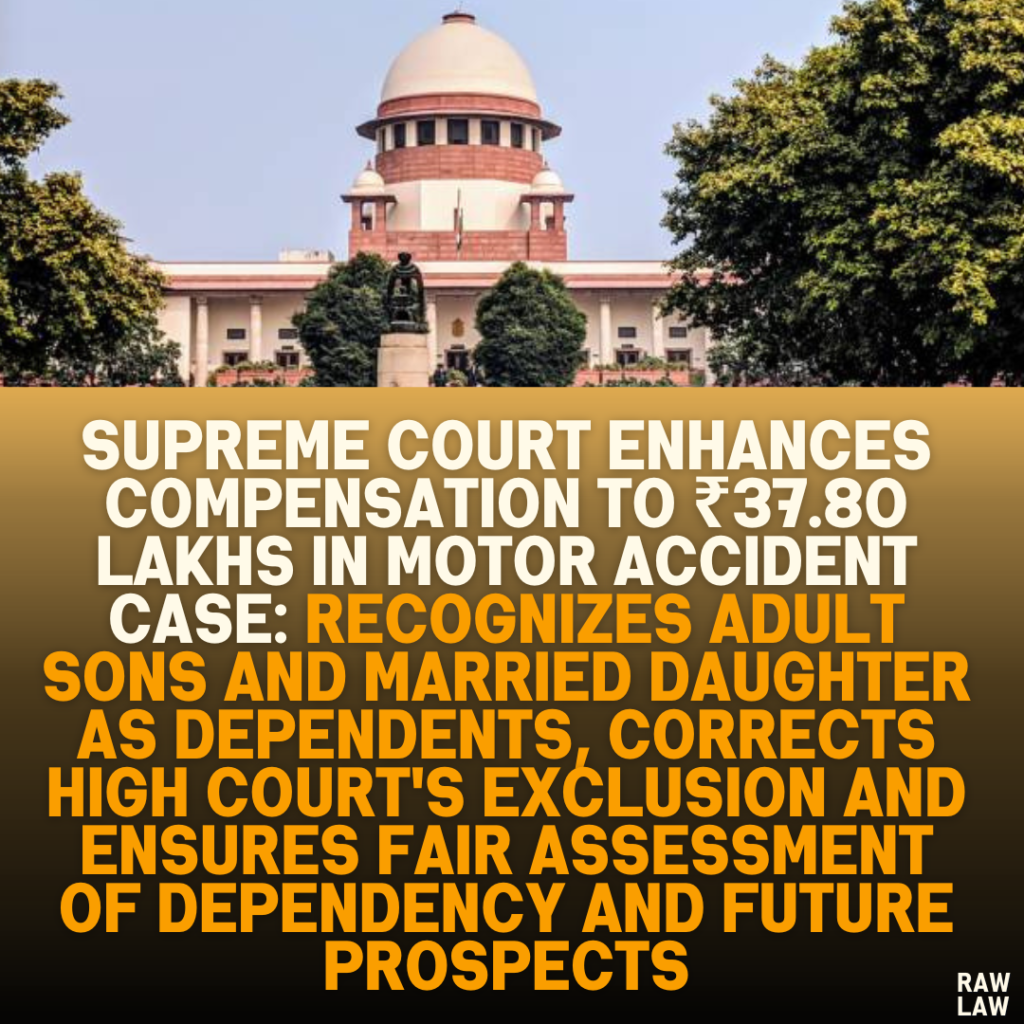Court’s Decision:
The Supreme Court overturned the decision of the Punjab and Haryana High Court, which had excluded adult sons and a married daughter of the deceased from the scope of dependents for compensation purposes. The Court enhanced the compensation payable to the claimants to ₹37,80,681, up from the amount awarded by the High Court and the Motor Accident Claims Tribunal (MACT).
Facts:
- Incident: The case stems from a tragic road accident on May 13, 2015, where Dev Raj, a 50-year-old employee of Punjab State Power Corporation Limited, lost his life. He was hit by a bus that was being driven rashly and negligently.
- Claimants: The deceased’s family included his wife, a married daughter, and two adult sons. They filed a claim petition seeking compensation of ₹50,00,000, arguing that the deceased earned more than ₹50,000 per month and was the sole breadwinner of the family.
- MACT Order: The Tribunal awarded ₹24,36,155 to the claimants, determining the deceased’s monthly income as ₹23,345. It also held that all four claimants were dependents.
- High Court Decision: On appeal, the High Court made two key modifications:
- It accepted the claimants’ argument for the inclusion of future prospects at 30%, as per judicial precedents.
- However, it excluded the two sons and the married daughter as dependents, asserting that they were not financially dependent on the deceased, and applied a 50% deduction for personal expenses instead of the 1/4 deduction used by the Tribunal. The revised compensation was set at ₹24,44,183.
The claimants appealed to the Supreme Court, challenging the exclusion of the adult sons and married daughter as dependents and seeking higher compensation.
Issues:
- Are adult sons and a married daughter of the deceased eligible to be considered as dependents for compensation purposes under the Motor Vehicles Act?
- Is the compensation awarded by the Tribunal and the High Court adequate or does it require enhancement?
Petitioner’s Arguments:
- Dependency of Sons and Daughter: The claimants argued that the High Court wrongly excluded the sons and the married daughter as dependents. They relied on precedents where even earning family members, under certain circumstances, were considered dependents.
- Inadequate Compensation: The petitioners contended that the compensation awarded by the High Court was insufficient and failed to account fully for the future prospects and other heads of compensation.
Respondent’s Arguments:
- Dependency Criteria: The insurance company maintained that the adult sons and married daughter were not dependents for the purpose of compensation, as they were not financially reliant on the deceased at the time of his death.
- Higher Deduction: The insurance company supported the High Court’s application of a 50% deduction for personal expenses, arguing that the deceased had fewer dependents.
Analysis of the Law:
- Dependency of Legal Representatives:
- The Court applied the principles established in National Insurance Co. Ltd. v. Birender & Ors., which clarified that adult children, even if earning, could be considered dependents based on the specific facts of the case. The Court emphasized that dependency is not solely determined by financial independence but also by other factors such as living arrangements and the extent of financial support provided by the deceased.
- In this case, the adult sons were earning modest incomes and living with the deceased, while the married daughter’s dependency was acknowledged based on her relationship and circumstances.
- Calculation of Compensation:
- The Court followed the guidelines established in National Insurance Co. Ltd. v. Pranay Sethi (2017) for computing compensation:
- Future Prospects: 30% was added to the annual income of the deceased as he was aged 50.
- Deduction for Personal Expenses: The Court held that a 1/4 deduction for personal expenses was appropriate, considering all claimants as dependents.
- Multiplier: The multiplier of 13, based on the deceased’s age, was applied to calculate the total loss of dependency.
- The Court followed the guidelines established in National Insurance Co. Ltd. v. Pranay Sethi (2017) for computing compensation:
Precedent Analysis:
- National Insurance Co. Ltd. v. Birender & Ors. (2020): This case established that even married and earning children could qualify as dependents if they were partly reliant on the deceased. The Supreme Court referred to this case to support the inclusion of the sons and married daughter as dependents.
- National Insurance Co. Ltd. v. Pranay Sethi (2017): This precedent was applied to calculate the compensation under various heads, including future prospects, consortium, and funeral expenses.
Court’s Reasoning:
The Court concluded that:
- The High Court erred in excluding the adult sons and married daughter as dependents. Both sons were earning modest incomes and lived with the deceased, while the daughter, though married, had a legitimate claim as a legal representative.
- The compensation awarded by the High Court and MACT was insufficient. Applying the correct legal principles, the Court recalculated the compensation.
The recalculated compensation included:
- Loss of Dependency: ₹35,50,781
- Loss of Estate: ₹18,150
- Funeral Expenses: ₹18,150
- Loss of Consortium: ₹1,93,600
- Total Compensation: ₹37,80,681
Conclusion:
The Supreme Court allowed the appeal, holding that all claimants were dependents under the law. It enhanced the compensation to ₹37,80,681, directing the respondents to pay the amount with interest as awarded by the MACT.
Implications:
- This judgment reinforces the broader interpretation of dependency under the Motor Vehicles Act, recognizing that dependency is not confined to financial independence alone.
- The ruling ensures fair compensation for families of deceased victims, acknowledging the societal and emotional roles played by the deceased.
